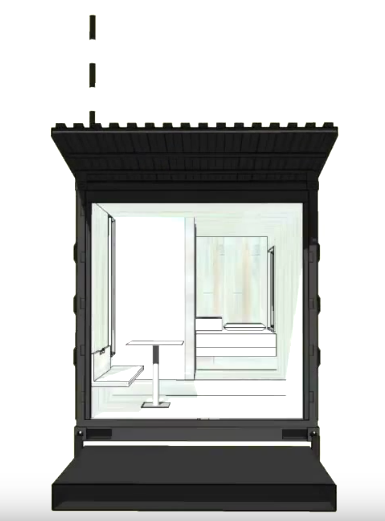In 2003, Geoffrey Warner created his first weeHouse, a prefabricated, 336-square-foot retreat for a violinist, delivered by semi to an off-the-grid site near Pepin, Wisconsin. A Dwell reader’s dream, it quickly became an icon of stripped-down modern living. He and his team at Alchemy Architects, based in St. Paul, have since built some three dozen prefab projects—some wee, some not-so-wee—combining comfort and restraint, a poetry of understatement.
On May 19, at Mia’s Third Thursday: Art of Sustainability event, Alchemy will debut the lightHouse, a prototype for a new kind of urban hotel and the next evolution of sustainable living.
“The weeHouses have all needed to be tailored to their site and clients,” Warner says. (The home of Mia’s Duncan and Nivin MacMillan Director and President Kaywin Feldman and her husband is a not-so-weeHouse, commissioned by someone who followed a job out of town before construction was completed. After struggling to find a contemporary home with lots of natural light, they learned of the prefab home from the sister of a Mia employee—a weeHouse fan.) “It’s not like they’re expensive, but with any new building there’s quite a bit of cost just buried into the site component. So we wanted to do something between a tent and a house that wasn’t a travel trailer—what would that look like?”
Warner started with a shipping container. Then, with the help of University of Minnesota architecture students, he carved out a door and windows, insulated the rectangle, and installed systems for both reducing energy use and tracking it—solar panels, in-floor heating, filtered wastewater—so that it could potentially exist as a self-sustaining unit off the grid. It could be picked up and moved, “as the flow of the city requires,” according to promo materials. An experiment in urban ecotourism.
Like the weeHouse, the first of which was outfitted with Ikea cabinetry and kitchen elements, the lightHouse features Alchemy’s trademark “tightwad panache” as a showcase for high-style, low-impact architecture. “This will expand the idea of what you can do with limited space—sustainable doesn’t mean it can’t be comfortable,” says Warner. “By inserting a room like this into the urban fabric, places both celebrated and ignored, you can start to talk about living in the city as an interaction with the urban environment.”
Alchemy had hoped to rent the lightHouse as a peripatetic hotel, on something like Airbnb, with a concierge making sure the sheets were changed and the water tank was filled. But they bumped up against Minneapolis and St. Paul regulations that require any place you sleep in to have a foundation and connect to sewer and water. Warner has pressed the issue with city officials, opening a discussion on changing urban needs similar to recent reconsideration of breweries as neighborhood bars. But for now the lightHouse is strictly a showpiece—a beacon of possibility.



